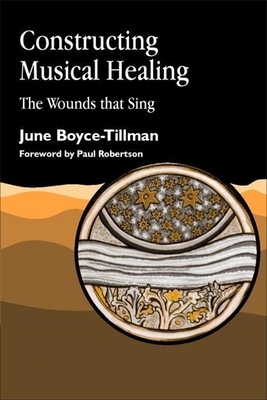Drawing on literature from philosophy, anthropology, psychology and musicology, Boyce-Tillman looks at musical traditions and notions of healing in different societies. Her work includes a number of case studies in various cultures - spirit possession cults in Africa and shamans in various traditions.
June Boyce-Tillman''s new book identifies and discusses the very issues that could render the education that we offer through music more engaging and relevent to those whom we teach. The book presents a wide-ranging and rich mix of psychological, ethnomusicological, philosophical, educational, mythological and theological material. Into this rich tapestry is woven a concern to consider seriously New Age phenomena and to empathize with people''s experiences and life stories. Very occasionally, a book is published that has the potential of seriously challenging current orthodoxy and practice. This is such a book.''
- British Journal of Music Education.
''June Boyce-Tillman has published this beautifully researched essay at what I think may prove to be a vital re-balancing point in our history, when there is a developing realisation that post-Enlightenment culture with its emphasis on scientific reason and logic needs to incorporate again the "subjugated ways of knowing" as June Boyce-Tillman terms Gooch''s value "system B" which favours being, subjectivity, personal feeling, emotion, magic, involvement, associative ways of knowing, belief and non-causal knowledge... The bibliography and referencing are excellent, massively extending the hub of resource which this book itself presents for further study, investigation and good practice by people from many walks of life. Many thanks to June Boyce-Tillman for her work.''
- The Christian Parapsychologist
''In Constructing Musical Healing, June Boyce-Tillman attempts to blend ancient and modern ideas and practices with her own perspective as a New Age practitioner. In an interdisciplinary effort, Boyce-Tillman describer particular philosophical aspects concerning Western music, practices of shamans and healers, and explorations of the new consciousness reflected in the New Age movement and music therapy. Her goal is to establish a new model of healing as balance including physical, psychological, and spiritual elements in a process approach, which she parallels with music therapy practice...Boyce-Tillman has some promising ideas. And certainly she adds her words, her thoughts, and beliefs to the continuing questions about the compatibility between "healing" and "therapy"...The strength of the book is that it has the potential to encourage our own discourse by giving us an opportunity to compare and contrast our own ideas about music therapy with at least one New Age practitioner.''
- The Arts in Psychotherapy
Drawing on literature from philosophy, anthropology, psychology and musicology, Boyce-Tillman looks at musical traditions and notions of healing in different societies. Her work includes a number of case studies in various cultures - spirit possession cults in Africa and shamans in various traditions. It explores contemporary musical practice in the New Age including neo-shamanism and notions of musical healing in Western musical aesthetics. The use of music in Western medicine is also studied, as Boyce-Tillman draws together a theory of what actually occurs when music is associated with therapeutic intention and examines the role of music within healthcare, education and the community.
Get Constructing Musical Healing by at the best price and quality guranteed only at Werezi Africa largest book ecommerce store. The book was published by Jessica Kingsley Publishers and it has pages. Enjoy Shopping Best Offers & Deals on books Online from Werezi - Receive at your doorstep - Fast Delivery - Secure mode of Payment
 Jacket, Women
Jacket, Women
 Woolend Jacket
Woolend Jacket
 Western denim
Western denim
 Mini Dresss
Mini Dresss
 Jacket, Women
Jacket, Women
 Woolend Jacket
Woolend Jacket
 Western denim
Western denim
 Mini Dresss
Mini Dresss
 Jacket, Women
Jacket, Women
 Woolend Jacket
Woolend Jacket
 Western denim
Western denim
 Mini Dresss
Mini Dresss
 Jacket, Women
Jacket, Women
 Woolend Jacket
Woolend Jacket
 Western denim
Western denim
 Mini Dresss
Mini Dresss
 Jacket, Women
Jacket, Women
 Woolend Jacket
Woolend Jacket
 Western denim
Western denim
 Mini Dresss
Mini Dresss






























































